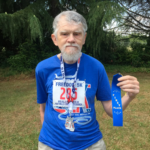 Some people with a Covid-19 infection show no symptoms at all and after the disease runs its course, they recover and can no longer infect others. Some people do show symptoms, feel ill for weeks or months, and eventually recover. Other people become seriously ill, require hospitalization, and many of them die. Until recently, the prognosis for patients with serious disease, on mechanical ventilation or supplementary oxygen, has not been good. Continue reading
Some people with a Covid-19 infection show no symptoms at all and after the disease runs its course, they recover and can no longer infect others. Some people do show symptoms, feel ill for weeks or months, and eventually recover. Other people become seriously ill, require hospitalization, and many of them die. Until recently, the prognosis for patients with serious disease, on mechanical ventilation or supplementary oxygen, has not been good. Continue reading
Tag Archives: Allen Taylor
#292 – TROPICAL DISEASES ARE SPREADING. ARE YOU READY? – ALLEN TAYLOR
Featured
 People who live in temperate and polar climes, far from the equator, have not had to think much about the insect-borne diseases of the tropics. That situation is changing. As the globe warms, the diseases heard about in faraway lands are now on our doorstep. Some have already made it into the front vestibule. Continue reading
People who live in temperate and polar climes, far from the equator, have not had to think much about the insect-borne diseases of the tropics. That situation is changing. As the globe warms, the diseases heard about in faraway lands are now on our doorstep. Some have already made it into the front vestibule. Continue reading
#291 – PREVENTING DEMENTIA – ALLEN TAYLOR
Featured
 If you are lucky enough to survive Covid-19, as well as heart disease, cancer, and all the other slings and arrows that are directed your way by outrageous fortune, what a downer it would be to lose your mind to Alzheimer’s disease or one of the other forms of dementia. What can you do to avoid that fate? Continue reading
If you are lucky enough to survive Covid-19, as well as heart disease, cancer, and all the other slings and arrows that are directed your way by outrageous fortune, what a downer it would be to lose your mind to Alzheimer’s disease or one of the other forms of dementia. What can you do to avoid that fate? Continue reading
#290 – IF I STAY 6 FEET AWAY FROM EVERYBODY, THEN I’M SAFE. RIGHT? – ALLEN TAYLOR
Featured
T he World Health Organization (WHO) and the United States Department of Health and Human Services (HHS.gov) recommend what you should do to protect yourself against Covid-19. The guidelines include:
he World Health Organization (WHO) and the United States Department of Health and Human Services (HHS.gov) recommend what you should do to protect yourself against Covid-19. The guidelines include:
- Wash hands often
- Put 6 feet of distance between yourself and people who don’t live in your household
- Cover mouth and nose with a mask when around others
- Cover coughs and sneezes
- Clean and disinfect surfaces that people touch
- Be alert for symptoms such as fever, cough, and shortness of breath
#289 – NEW ALZHEIMER’S TREATMENT HOLDS PROMISE – ALLEN TAYLOR
Featured
 Alzheimer’s Disease (AD) patients and the people who are closest to them, suffer for years—the patient suffers the gradual loss of self and the friends and loved ones watch as the person they have known and loved fades away. This contrasts with the sharp, searing pain of loss that goes along with a fatal heart attack. In that case, the pain is acute, but it is quickly over. Friends can mourn, but in short order they can get on with their lives. With Alzheimer’s disease, friends and loved ones must live with the incremental loss that happens day after day. It is like a train wreck in slow motion. Continue reading
Alzheimer’s Disease (AD) patients and the people who are closest to them, suffer for years—the patient suffers the gradual loss of self and the friends and loved ones watch as the person they have known and loved fades away. This contrasts with the sharp, searing pain of loss that goes along with a fatal heart attack. In that case, the pain is acute, but it is quickly over. Friends can mourn, but in short order they can get on with their lives. With Alzheimer’s disease, friends and loved ones must live with the incremental loss that happens day after day. It is like a train wreck in slow motion. Continue reading